PACC6005, Semester 1: Economics Report on Non-Financial Information
VerifiedAdded on 2023/04/04
|10
|2168
|173
Report
AI Summary
This report examines the economic consequences of non-financial information reporting, focusing on environmental, social, and governance (ESG) factors and corporate social responsibility (CSR). It explores the nature of non-financial information, including its role in improving long-term performance and competitiveness. The report details the reasons for reporting non-financial information, such as improving internal organization, managing sustainability performance, and reinforcing financial market stability. It discusses how non-financial information should be reported, including integrated and sustainability reporting methods. The report also analyzes the economic consequences of non-financial information, such as its impact on firm value, cost of capital, and bank loans, supported by references to relevant journal articles. The conclusion emphasizes the importance of non-financial information for stakeholders, including investors and internal managers, in measuring performance and making decisions.

Running head: ECONOMICS
Economics
Name of the university
Name of the student
Economics
Name of the university
Name of the student
Paraphrase This Document
Need a fresh take? Get an instant paraphrase of this document with our AI Paraphraser
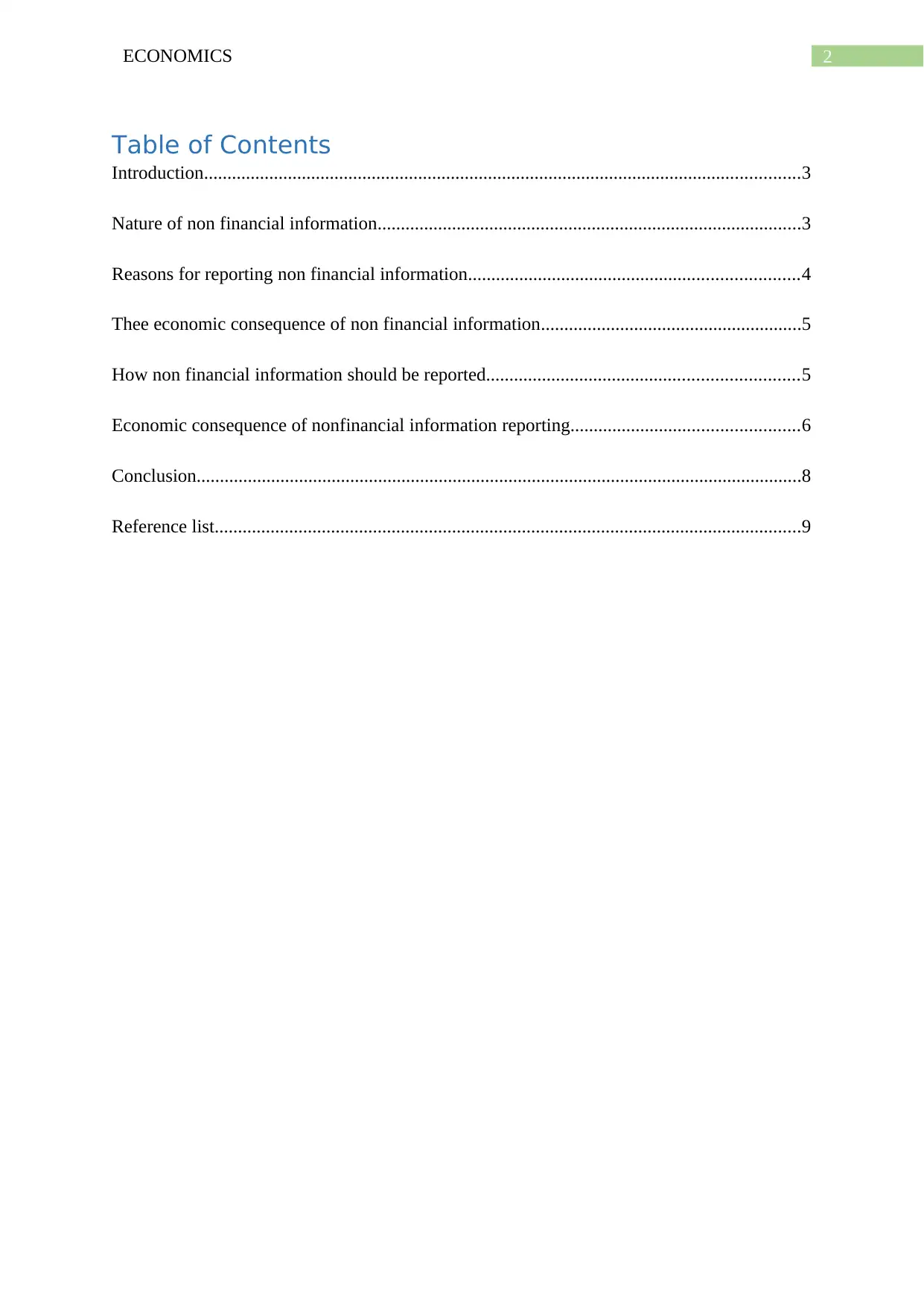
2ECONOMICS
Table of Contents
Introduction................................................................................................................................3
Nature of non financial information...........................................................................................3
Reasons for reporting non financial information.......................................................................4
Thee economic consequence of non financial information........................................................5
How non financial information should be reported...................................................................5
Economic consequence of nonfinancial information reporting.................................................6
Conclusion..................................................................................................................................8
Reference list..............................................................................................................................9
Table of Contents
Introduction................................................................................................................................3
Nature of non financial information...........................................................................................3
Reasons for reporting non financial information.......................................................................4
Thee economic consequence of non financial information........................................................5
How non financial information should be reported...................................................................5
Economic consequence of nonfinancial information reporting.................................................6
Conclusion..................................................................................................................................8
Reference list..............................................................................................................................9
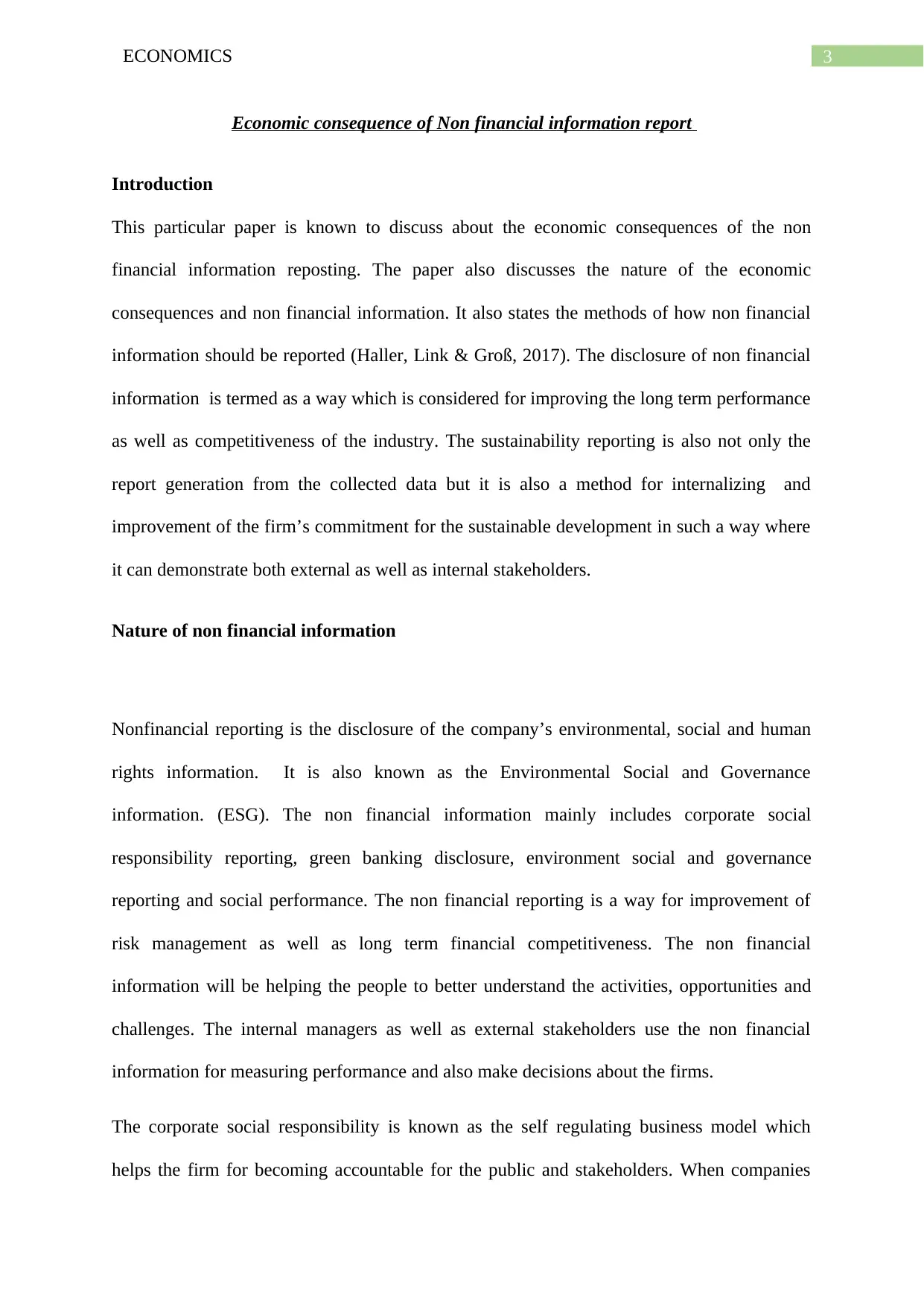
3ECONOMICS
Economic consequence of Non financial information report
Introduction
This particular paper is known to discuss about the economic consequences of the non
financial information reposting. The paper also discusses the nature of the economic
consequences and non financial information. It also states the methods of how non financial
information should be reported (Haller, Link & Groß, 2017). The disclosure of non financial
information is termed as a way which is considered for improving the long term performance
as well as competitiveness of the industry. The sustainability reporting is also not only the
report generation from the collected data but it is also a method for internalizing and
improvement of the firm’s commitment for the sustainable development in such a way where
it can demonstrate both external as well as internal stakeholders.
Nature of non financial information
Nonfinancial reporting is the disclosure of the company’s environmental, social and human
rights information. It is also known as the Environmental Social and Governance
information. (ESG). The non financial information mainly includes corporate social
responsibility reporting, green banking disclosure, environment social and governance
reporting and social performance. The non financial reporting is a way for improvement of
risk management as well as long term financial competitiveness. The non financial
information will be helping the people to better understand the activities, opportunities and
challenges. The internal managers as well as external stakeholders use the non financial
information for measuring performance and also make decisions about the firms.
The corporate social responsibility is known as the self regulating business model which
helps the firm for becoming accountable for the public and stakeholders. When companies
Economic consequence of Non financial information report
Introduction
This particular paper is known to discuss about the economic consequences of the non
financial information reposting. The paper also discusses the nature of the economic
consequences and non financial information. It also states the methods of how non financial
information should be reported (Haller, Link & Groß, 2017). The disclosure of non financial
information is termed as a way which is considered for improving the long term performance
as well as competitiveness of the industry. The sustainability reporting is also not only the
report generation from the collected data but it is also a method for internalizing and
improvement of the firm’s commitment for the sustainable development in such a way where
it can demonstrate both external as well as internal stakeholders.
Nature of non financial information
Nonfinancial reporting is the disclosure of the company’s environmental, social and human
rights information. It is also known as the Environmental Social and Governance
information. (ESG). The non financial information mainly includes corporate social
responsibility reporting, green banking disclosure, environment social and governance
reporting and social performance. The non financial reporting is a way for improvement of
risk management as well as long term financial competitiveness. The non financial
information will be helping the people to better understand the activities, opportunities and
challenges. The internal managers as well as external stakeholders use the non financial
information for measuring performance and also make decisions about the firms.
The corporate social responsibility is known as the self regulating business model which
helps the firm for becoming accountable for the public and stakeholders. When companies
⊘ This is a preview!⊘
Do you want full access?
Subscribe today to unlock all pages.

Trusted by 1+ million students worldwide
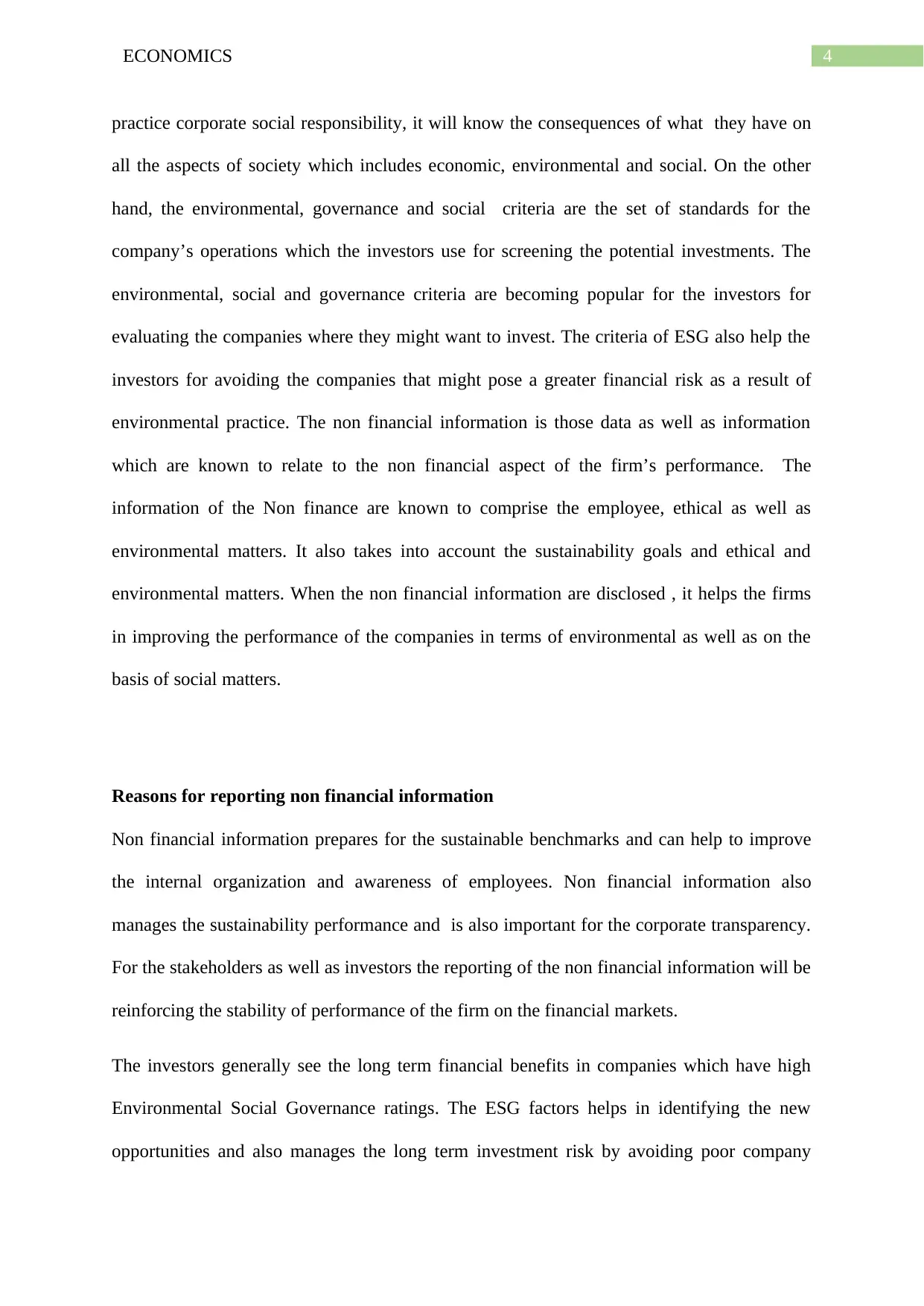
4ECONOMICS
practice corporate social responsibility, it will know the consequences of what they have on
all the aspects of society which includes economic, environmental and social. On the other
hand, the environmental, governance and social criteria are the set of standards for the
company’s operations which the investors use for screening the potential investments. The
environmental, social and governance criteria are becoming popular for the investors for
evaluating the companies where they might want to invest. The criteria of ESG also help the
investors for avoiding the companies that might pose a greater financial risk as a result of
environmental practice. The non financial information is those data as well as information
which are known to relate to the non financial aspect of the firm’s performance. The
information of the Non finance are known to comprise the employee, ethical as well as
environmental matters. It also takes into account the sustainability goals and ethical and
environmental matters. When the non financial information are disclosed , it helps the firms
in improving the performance of the companies in terms of environmental as well as on the
basis of social matters.
Reasons for reporting non financial information
Non financial information prepares for the sustainable benchmarks and can help to improve
the internal organization and awareness of employees. Non financial information also
manages the sustainability performance and is also important for the corporate transparency.
For the stakeholders as well as investors the reporting of the non financial information will be
reinforcing the stability of performance of the firm on the financial markets.
The investors generally see the long term financial benefits in companies which have high
Environmental Social Governance ratings. The ESG factors helps in identifying the new
opportunities and also manages the long term investment risk by avoiding poor company
practice corporate social responsibility, it will know the consequences of what they have on
all the aspects of society which includes economic, environmental and social. On the other
hand, the environmental, governance and social criteria are the set of standards for the
company’s operations which the investors use for screening the potential investments. The
environmental, social and governance criteria are becoming popular for the investors for
evaluating the companies where they might want to invest. The criteria of ESG also help the
investors for avoiding the companies that might pose a greater financial risk as a result of
environmental practice. The non financial information is those data as well as information
which are known to relate to the non financial aspect of the firm’s performance. The
information of the Non finance are known to comprise the employee, ethical as well as
environmental matters. It also takes into account the sustainability goals and ethical and
environmental matters. When the non financial information are disclosed , it helps the firms
in improving the performance of the companies in terms of environmental as well as on the
basis of social matters.
Reasons for reporting non financial information
Non financial information prepares for the sustainable benchmarks and can help to improve
the internal organization and awareness of employees. Non financial information also
manages the sustainability performance and is also important for the corporate transparency.
For the stakeholders as well as investors the reporting of the non financial information will be
reinforcing the stability of performance of the firm on the financial markets.
The investors generally see the long term financial benefits in companies which have high
Environmental Social Governance ratings. The ESG factors helps in identifying the new
opportunities and also manages the long term investment risk by avoiding poor company
Paraphrase This Document
Need a fresh take? Get an instant paraphrase of this document with our AI Paraphraser
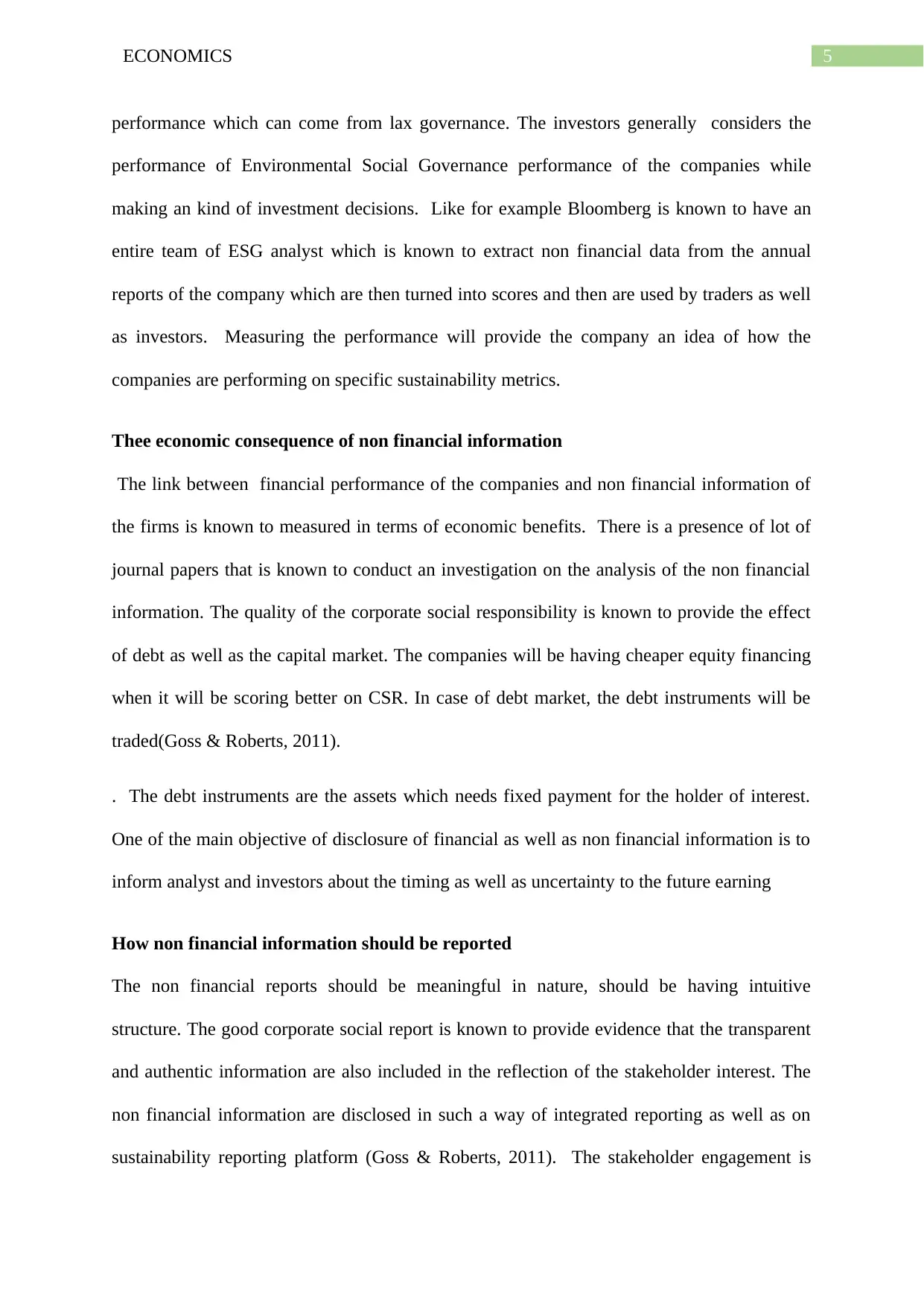
5ECONOMICS
performance which can come from lax governance. The investors generally considers the
performance of Environmental Social Governance performance of the companies while
making an kind of investment decisions. Like for example Bloomberg is known to have an
entire team of ESG analyst which is known to extract non financial data from the annual
reports of the company which are then turned into scores and then are used by traders as well
as investors. Measuring the performance will provide the company an idea of how the
companies are performing on specific sustainability metrics.
Thee economic consequence of non financial information
The link between financial performance of the companies and non financial information of
the firms is known to measured in terms of economic benefits. There is a presence of lot of
journal papers that is known to conduct an investigation on the analysis of the non financial
information. The quality of the corporate social responsibility is known to provide the effect
of debt as well as the capital market. The companies will be having cheaper equity financing
when it will be scoring better on CSR. In case of debt market, the debt instruments will be
traded(Goss & Roberts, 2011).
. The debt instruments are the assets which needs fixed payment for the holder of interest.
One of the main objective of disclosure of financial as well as non financial information is to
inform analyst and investors about the timing as well as uncertainty to the future earning
How non financial information should be reported
The non financial reports should be meaningful in nature, should be having intuitive
structure. The good corporate social report is known to provide evidence that the transparent
and authentic information are also included in the reflection of the stakeholder interest. The
non financial information are disclosed in such a way of integrated reporting as well as on
sustainability reporting platform (Goss & Roberts, 2011). The stakeholder engagement is
performance which can come from lax governance. The investors generally considers the
performance of Environmental Social Governance performance of the companies while
making an kind of investment decisions. Like for example Bloomberg is known to have an
entire team of ESG analyst which is known to extract non financial data from the annual
reports of the company which are then turned into scores and then are used by traders as well
as investors. Measuring the performance will provide the company an idea of how the
companies are performing on specific sustainability metrics.
Thee economic consequence of non financial information
The link between financial performance of the companies and non financial information of
the firms is known to measured in terms of economic benefits. There is a presence of lot of
journal papers that is known to conduct an investigation on the analysis of the non financial
information. The quality of the corporate social responsibility is known to provide the effect
of debt as well as the capital market. The companies will be having cheaper equity financing
when it will be scoring better on CSR. In case of debt market, the debt instruments will be
traded(Goss & Roberts, 2011).
. The debt instruments are the assets which needs fixed payment for the holder of interest.
One of the main objective of disclosure of financial as well as non financial information is to
inform analyst and investors about the timing as well as uncertainty to the future earning
How non financial information should be reported
The non financial reports should be meaningful in nature, should be having intuitive
structure. The good corporate social report is known to provide evidence that the transparent
and authentic information are also included in the reflection of the stakeholder interest. The
non financial information are disclosed in such a way of integrated reporting as well as on
sustainability reporting platform (Goss & Roberts, 2011). The stakeholder engagement is
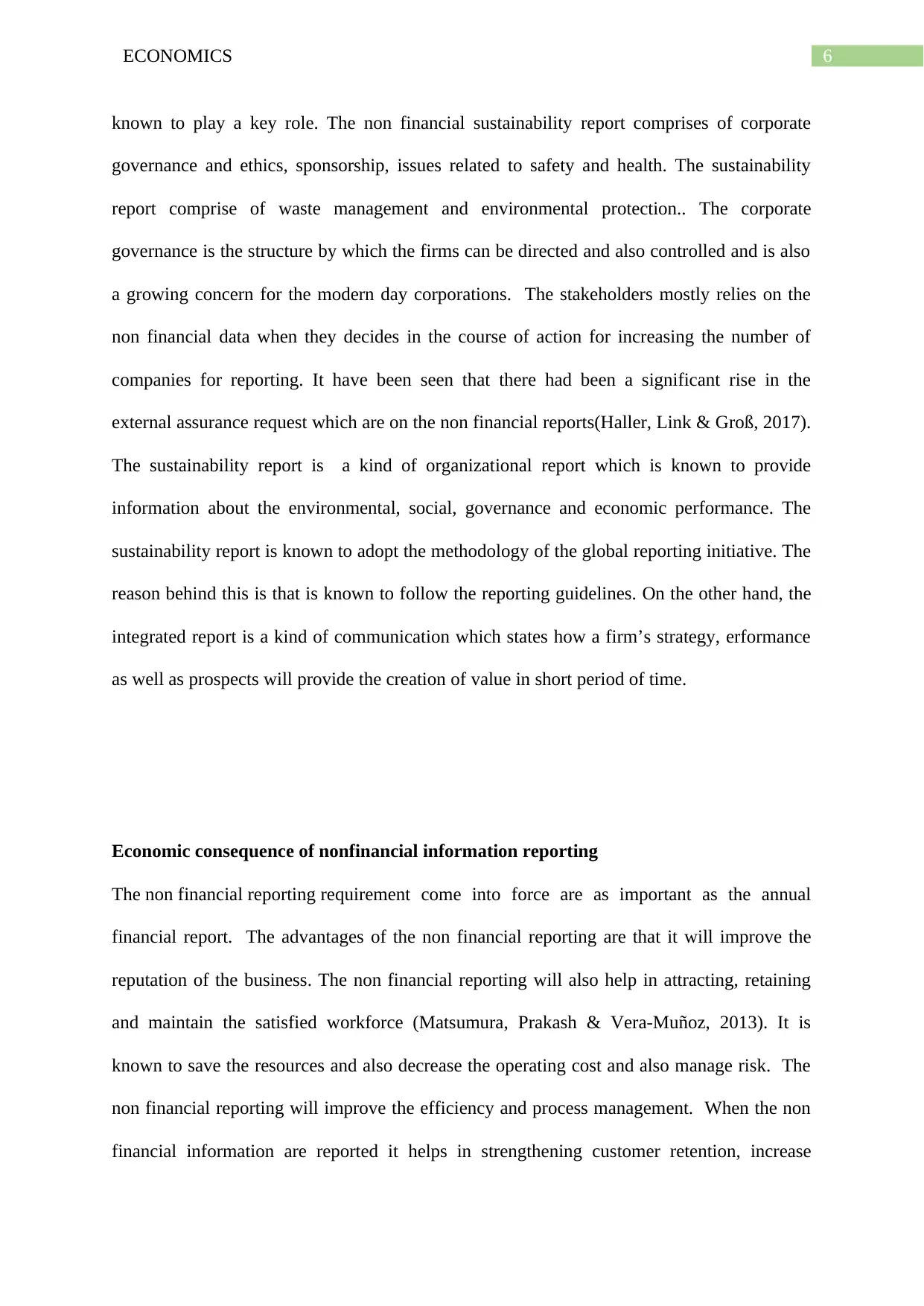
6ECONOMICS
known to play a key role. The non financial sustainability report comprises of corporate
governance and ethics, sponsorship, issues related to safety and health. The sustainability
report comprise of waste management and environmental protection.. The corporate
governance is the structure by which the firms can be directed and also controlled and is also
a growing concern for the modern day corporations. The stakeholders mostly relies on the
non financial data when they decides in the course of action for increasing the number of
companies for reporting. It have been seen that there had been a significant rise in the
external assurance request which are on the non financial reports(Haller, Link & Groß, 2017).
The sustainability report is a kind of organizational report which is known to provide
information about the environmental, social, governance and economic performance. The
sustainability report is known to adopt the methodology of the global reporting initiative. The
reason behind this is that is known to follow the reporting guidelines. On the other hand, the
integrated report is a kind of communication which states how a firm’s strategy, erformance
as well as prospects will provide the creation of value in short period of time.
Economic consequence of nonfinancial information reporting
The non financial reporting requirement come into force are as important as the annual
financial report. The advantages of the non financial reporting are that it will improve the
reputation of the business. The non financial reporting will also help in attracting, retaining
and maintain the satisfied workforce (Matsumura, Prakash & Vera-Muñoz, 2013). It is
known to save the resources and also decrease the operating cost and also manage risk. The
non financial reporting will improve the efficiency and process management. When the non
financial information are reported it helps in strengthening customer retention, increase
known to play a key role. The non financial sustainability report comprises of corporate
governance and ethics, sponsorship, issues related to safety and health. The sustainability
report comprise of waste management and environmental protection.. The corporate
governance is the structure by which the firms can be directed and also controlled and is also
a growing concern for the modern day corporations. The stakeholders mostly relies on the
non financial data when they decides in the course of action for increasing the number of
companies for reporting. It have been seen that there had been a significant rise in the
external assurance request which are on the non financial reports(Haller, Link & Groß, 2017).
The sustainability report is a kind of organizational report which is known to provide
information about the environmental, social, governance and economic performance. The
sustainability report is known to adopt the methodology of the global reporting initiative. The
reason behind this is that is known to follow the reporting guidelines. On the other hand, the
integrated report is a kind of communication which states how a firm’s strategy, erformance
as well as prospects will provide the creation of value in short period of time.
Economic consequence of nonfinancial information reporting
The non financial reporting requirement come into force are as important as the annual
financial report. The advantages of the non financial reporting are that it will improve the
reputation of the business. The non financial reporting will also help in attracting, retaining
and maintain the satisfied workforce (Matsumura, Prakash & Vera-Muñoz, 2013). It is
known to save the resources and also decrease the operating cost and also manage risk. The
non financial reporting will improve the efficiency and process management. When the non
financial information are reported it helps in strengthening customer retention, increase
⊘ This is a preview!⊘
Do you want full access?
Subscribe today to unlock all pages.

Trusted by 1+ million students worldwide
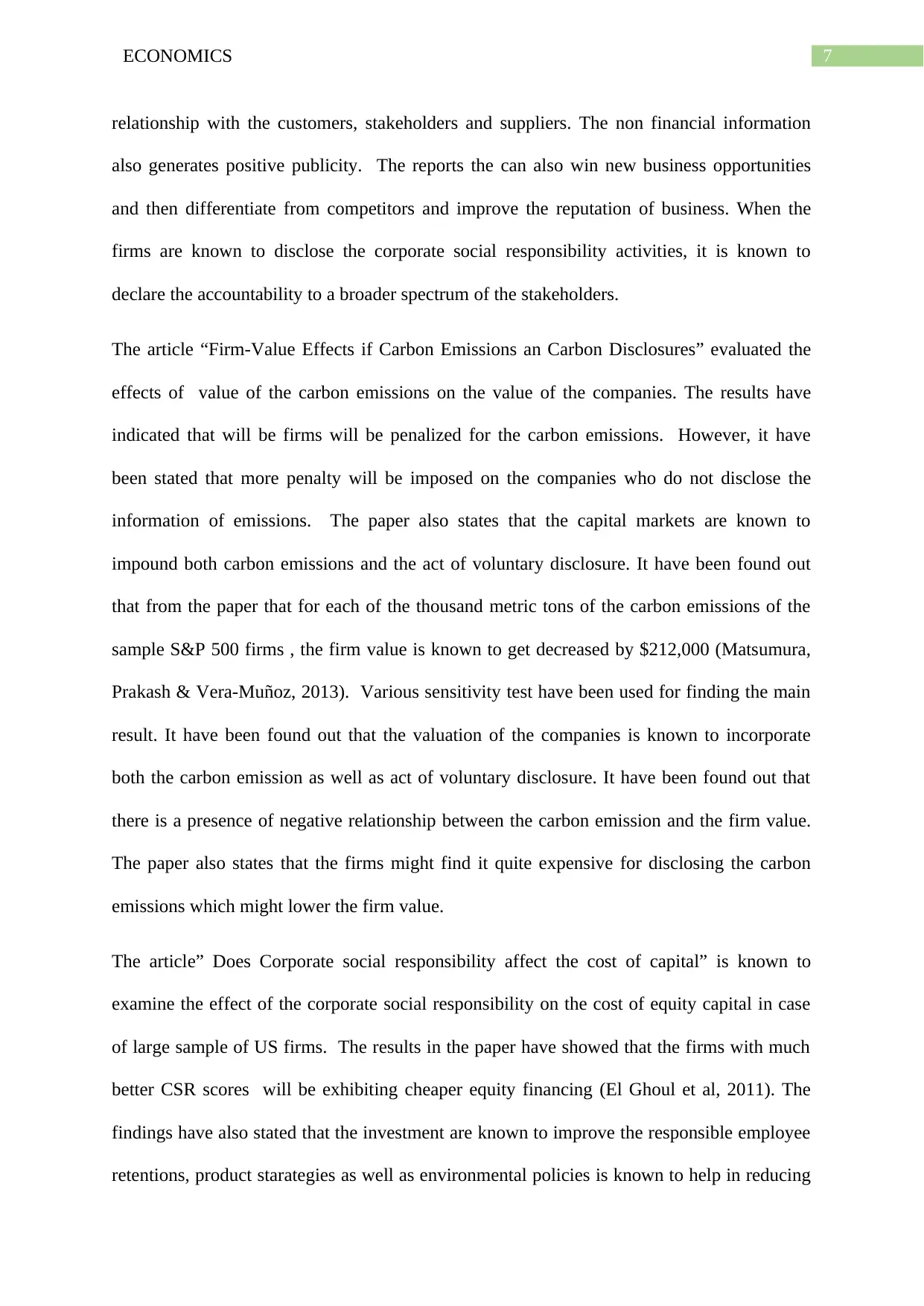
7ECONOMICS
relationship with the customers, stakeholders and suppliers. The non financial information
also generates positive publicity. The reports the can also win new business opportunities
and then differentiate from competitors and improve the reputation of business. When the
firms are known to disclose the corporate social responsibility activities, it is known to
declare the accountability to a broader spectrum of the stakeholders.
The article “Firm-Value Effects if Carbon Emissions an Carbon Disclosures” evaluated the
effects of value of the carbon emissions on the value of the companies. The results have
indicated that will be firms will be penalized for the carbon emissions. However, it have
been stated that more penalty will be imposed on the companies who do not disclose the
information of emissions. The paper also states that the capital markets are known to
impound both carbon emissions and the act of voluntary disclosure. It have been found out
that from the paper that for each of the thousand metric tons of the carbon emissions of the
sample S&P 500 firms , the firm value is known to get decreased by $212,000 (Matsumura,
Prakash & Vera-Muñoz, 2013). Various sensitivity test have been used for finding the main
result. It have been found out that the valuation of the companies is known to incorporate
both the carbon emission as well as act of voluntary disclosure. It have been found out that
there is a presence of negative relationship between the carbon emission and the firm value.
The paper also states that the firms might find it quite expensive for disclosing the carbon
emissions which might lower the firm value.
The article” Does Corporate social responsibility affect the cost of capital” is known to
examine the effect of the corporate social responsibility on the cost of equity capital in case
of large sample of US firms. The results in the paper have showed that the firms with much
better CSR scores will be exhibiting cheaper equity financing (El Ghoul et al, 2011). The
findings have also stated that the investment are known to improve the responsible employee
retentions, product starategies as well as environmental policies is known to help in reducing
relationship with the customers, stakeholders and suppliers. The non financial information
also generates positive publicity. The reports the can also win new business opportunities
and then differentiate from competitors and improve the reputation of business. When the
firms are known to disclose the corporate social responsibility activities, it is known to
declare the accountability to a broader spectrum of the stakeholders.
The article “Firm-Value Effects if Carbon Emissions an Carbon Disclosures” evaluated the
effects of value of the carbon emissions on the value of the companies. The results have
indicated that will be firms will be penalized for the carbon emissions. However, it have
been stated that more penalty will be imposed on the companies who do not disclose the
information of emissions. The paper also states that the capital markets are known to
impound both carbon emissions and the act of voluntary disclosure. It have been found out
that from the paper that for each of the thousand metric tons of the carbon emissions of the
sample S&P 500 firms , the firm value is known to get decreased by $212,000 (Matsumura,
Prakash & Vera-Muñoz, 2013). Various sensitivity test have been used for finding the main
result. It have been found out that the valuation of the companies is known to incorporate
both the carbon emission as well as act of voluntary disclosure. It have been found out that
there is a presence of negative relationship between the carbon emission and the firm value.
The paper also states that the firms might find it quite expensive for disclosing the carbon
emissions which might lower the firm value.
The article” Does Corporate social responsibility affect the cost of capital” is known to
examine the effect of the corporate social responsibility on the cost of equity capital in case
of large sample of US firms. The results in the paper have showed that the firms with much
better CSR scores will be exhibiting cheaper equity financing (El Ghoul et al, 2011). The
findings have also stated that the investment are known to improve the responsible employee
retentions, product starategies as well as environmental policies is known to help in reducing
Paraphrase This Document
Need a fresh take? Get an instant paraphrase of this document with our AI Paraphraser
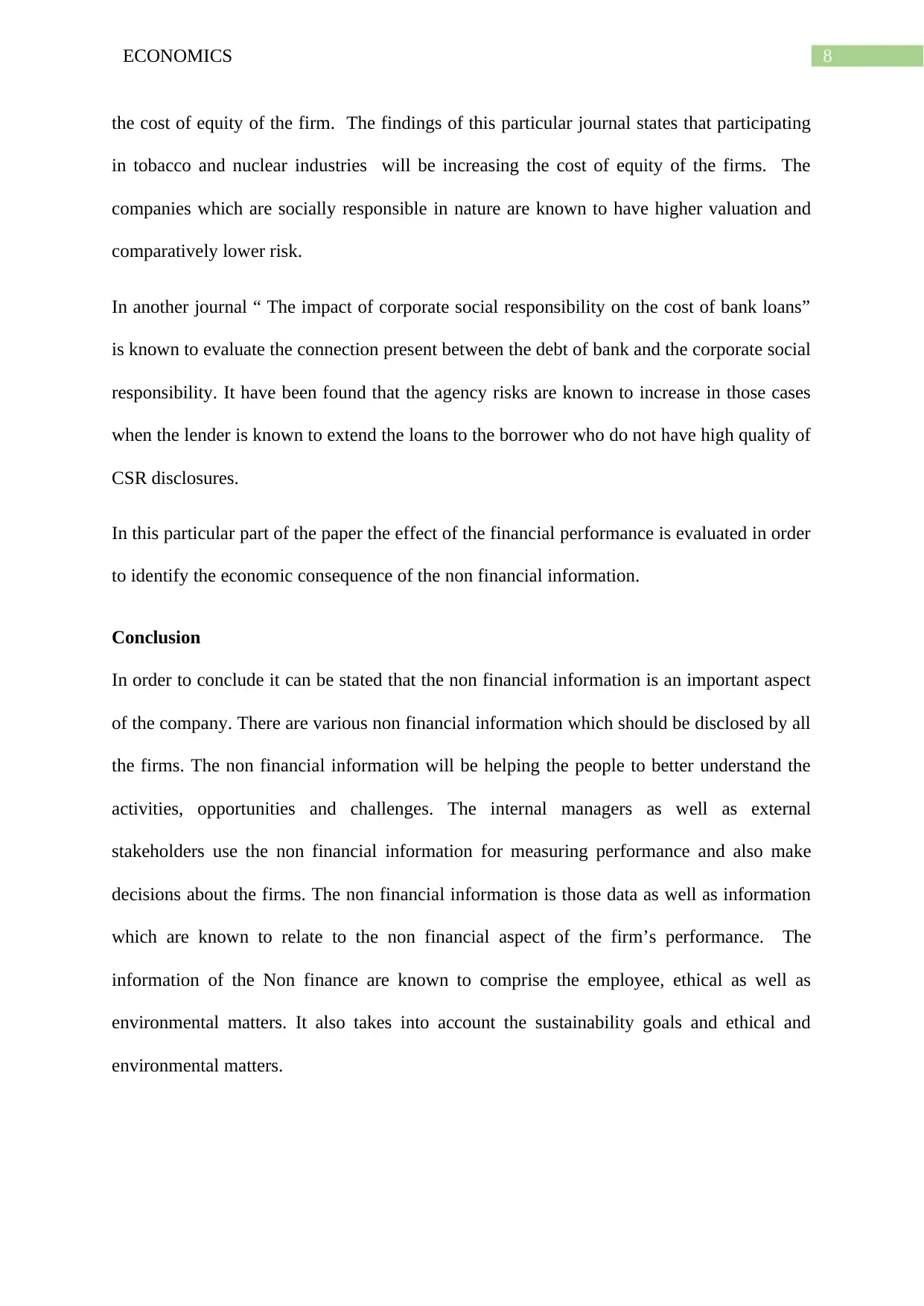
8ECONOMICS
the cost of equity of the firm. The findings of this particular journal states that participating
in tobacco and nuclear industries will be increasing the cost of equity of the firms. The
companies which are socially responsible in nature are known to have higher valuation and
comparatively lower risk.
In another journal “ The impact of corporate social responsibility on the cost of bank loans”
is known to evaluate the connection present between the debt of bank and the corporate social
responsibility. It have been found that the agency risks are known to increase in those cases
when the lender is known to extend the loans to the borrower who do not have high quality of
CSR disclosures.
In this particular part of the paper the effect of the financial performance is evaluated in order
to identify the economic consequence of the non financial information.
Conclusion
In order to conclude it can be stated that the non financial information is an important aspect
of the company. There are various non financial information which should be disclosed by all
the firms. The non financial information will be helping the people to better understand the
activities, opportunities and challenges. The internal managers as well as external
stakeholders use the non financial information for measuring performance and also make
decisions about the firms. The non financial information is those data as well as information
which are known to relate to the non financial aspect of the firm’s performance. The
information of the Non finance are known to comprise the employee, ethical as well as
environmental matters. It also takes into account the sustainability goals and ethical and
environmental matters.
the cost of equity of the firm. The findings of this particular journal states that participating
in tobacco and nuclear industries will be increasing the cost of equity of the firms. The
companies which are socially responsible in nature are known to have higher valuation and
comparatively lower risk.
In another journal “ The impact of corporate social responsibility on the cost of bank loans”
is known to evaluate the connection present between the debt of bank and the corporate social
responsibility. It have been found that the agency risks are known to increase in those cases
when the lender is known to extend the loans to the borrower who do not have high quality of
CSR disclosures.
In this particular part of the paper the effect of the financial performance is evaluated in order
to identify the economic consequence of the non financial information.
Conclusion
In order to conclude it can be stated that the non financial information is an important aspect
of the company. There are various non financial information which should be disclosed by all
the firms. The non financial information will be helping the people to better understand the
activities, opportunities and challenges. The internal managers as well as external
stakeholders use the non financial information for measuring performance and also make
decisions about the firms. The non financial information is those data as well as information
which are known to relate to the non financial aspect of the firm’s performance. The
information of the Non finance are known to comprise the employee, ethical as well as
environmental matters. It also takes into account the sustainability goals and ethical and
environmental matters.
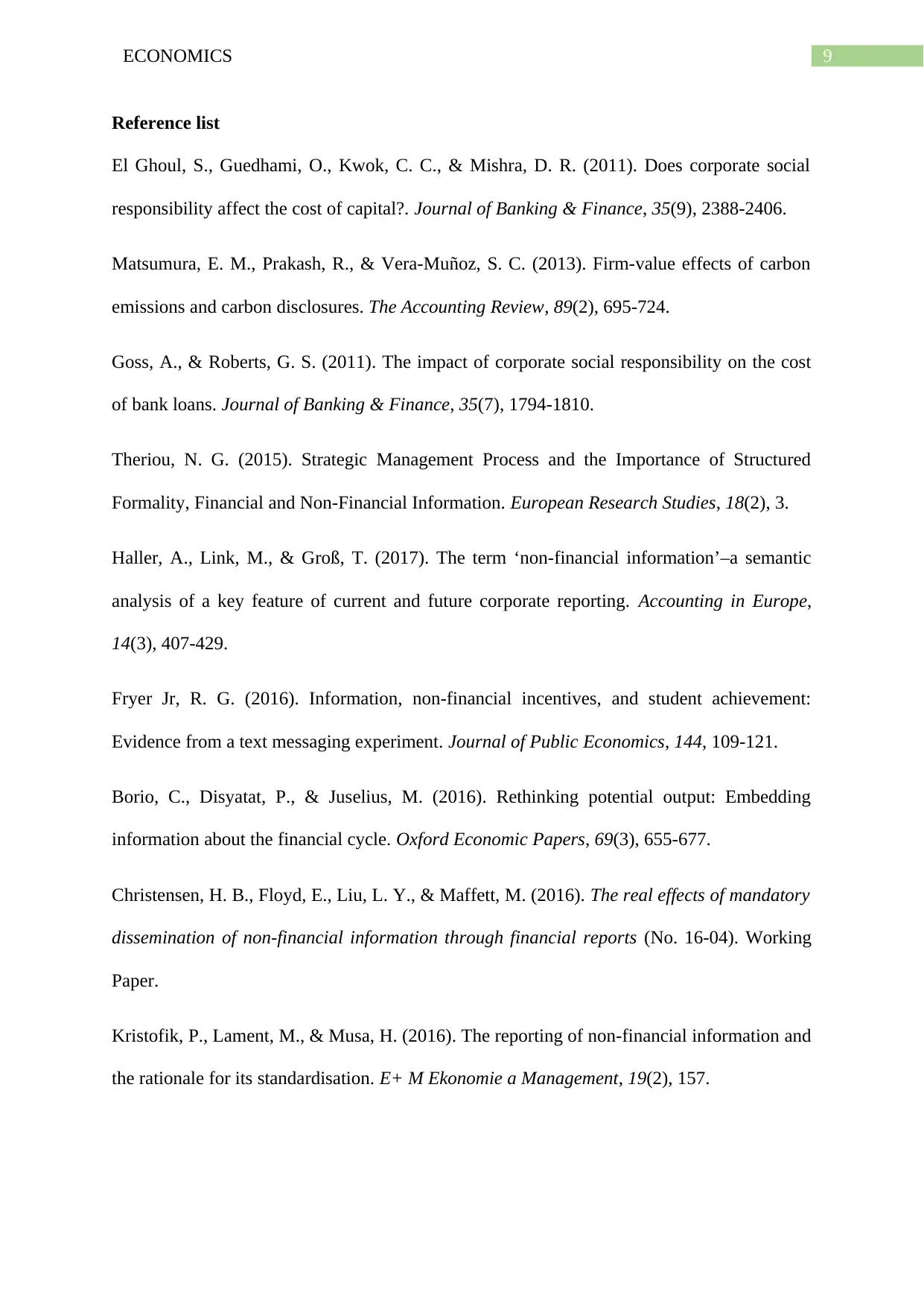
9ECONOMICS
Reference list
El Ghoul, S., Guedhami, O., Kwok, C. C., & Mishra, D. R. (2011). Does corporate social
responsibility affect the cost of capital?. Journal of Banking & Finance, 35(9), 2388-2406.
Matsumura, E. M., Prakash, R., & Vera-Muñoz, S. C. (2013). Firm-value effects of carbon
emissions and carbon disclosures. The Accounting Review, 89(2), 695-724.
Goss, A., & Roberts, G. S. (2011). The impact of corporate social responsibility on the cost
of bank loans. Journal of Banking & Finance, 35(7), 1794-1810.
Theriou, N. G. (2015). Strategic Management Process and the Importance of Structured
Formality, Financial and Non-Financial Information. European Research Studies, 18(2), 3.
Haller, A., Link, M., & Groß, T. (2017). The term ‘non-financial information’–a semantic
analysis of a key feature of current and future corporate reporting. Accounting in Europe,
14(3), 407-429.
Fryer Jr, R. G. (2016). Information, non-financial incentives, and student achievement:
Evidence from a text messaging experiment. Journal of Public Economics, 144, 109-121.
Borio, C., Disyatat, P., & Juselius, M. (2016). Rethinking potential output: Embedding
information about the financial cycle. Oxford Economic Papers, 69(3), 655-677.
Christensen, H. B., Floyd, E., Liu, L. Y., & Maffett, M. (2016). The real effects of mandatory
dissemination of non-financial information through financial reports (No. 16-04). Working
Paper.
Kristofik, P., Lament, M., & Musa, H. (2016). The reporting of non-financial information and
the rationale for its standardisation. E+ M Ekonomie a Management, 19(2), 157.
Reference list
El Ghoul, S., Guedhami, O., Kwok, C. C., & Mishra, D. R. (2011). Does corporate social
responsibility affect the cost of capital?. Journal of Banking & Finance, 35(9), 2388-2406.
Matsumura, E. M., Prakash, R., & Vera-Muñoz, S. C. (2013). Firm-value effects of carbon
emissions and carbon disclosures. The Accounting Review, 89(2), 695-724.
Goss, A., & Roberts, G. S. (2011). The impact of corporate social responsibility on the cost
of bank loans. Journal of Banking & Finance, 35(7), 1794-1810.
Theriou, N. G. (2015). Strategic Management Process and the Importance of Structured
Formality, Financial and Non-Financial Information. European Research Studies, 18(2), 3.
Haller, A., Link, M., & Groß, T. (2017). The term ‘non-financial information’–a semantic
analysis of a key feature of current and future corporate reporting. Accounting in Europe,
14(3), 407-429.
Fryer Jr, R. G. (2016). Information, non-financial incentives, and student achievement:
Evidence from a text messaging experiment. Journal of Public Economics, 144, 109-121.
Borio, C., Disyatat, P., & Juselius, M. (2016). Rethinking potential output: Embedding
information about the financial cycle. Oxford Economic Papers, 69(3), 655-677.
Christensen, H. B., Floyd, E., Liu, L. Y., & Maffett, M. (2016). The real effects of mandatory
dissemination of non-financial information through financial reports (No. 16-04). Working
Paper.
Kristofik, P., Lament, M., & Musa, H. (2016). The reporting of non-financial information and
the rationale for its standardisation. E+ M Ekonomie a Management, 19(2), 157.
⊘ This is a preview!⊘
Do you want full access?
Subscribe today to unlock all pages.

Trusted by 1+ million students worldwide

10ECONOMICS
Lament, M. (2016). Quality of non-financial information reported by financial institutions.
The example of Poland. The 10th International Days of Statistics and Economics, Prague,
1031-1040.
Martínez‐Ferrero, J., Garcia‐Sanchez, I. M., & Cuadrado‐Ballesteros, B. (2015). Effect of
financial reporting quality on sustainability information disclosure. Corporate Social
Responsibility and Environmental Management, 22(1), 45-64.
Lament, M. (2016). Quality of non-financial information reported by financial institutions.
The example of Poland. The 10th International Days of Statistics and Economics, Prague,
1031-1040.
Martínez‐Ferrero, J., Garcia‐Sanchez, I. M., & Cuadrado‐Ballesteros, B. (2015). Effect of
financial reporting quality on sustainability information disclosure. Corporate Social
Responsibility and Environmental Management, 22(1), 45-64.
1 out of 10
Related Documents
Your All-in-One AI-Powered Toolkit for Academic Success.
+13062052269
info@desklib.com
Available 24*7 on WhatsApp / Email
![[object Object]](/_next/static/media/star-bottom.7253800d.svg)
Unlock your academic potential
Copyright © 2020–2025 A2Z Services. All Rights Reserved. Developed and managed by ZUCOL.




